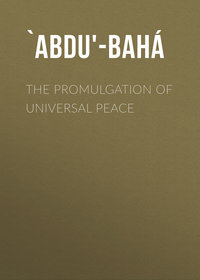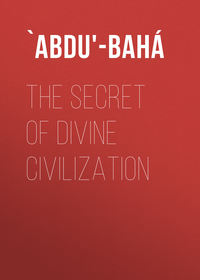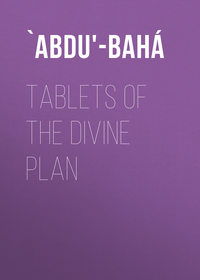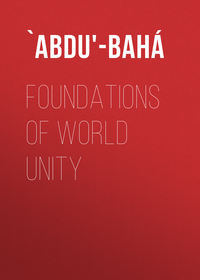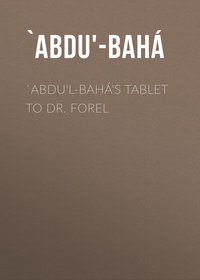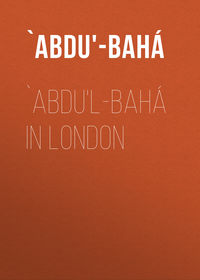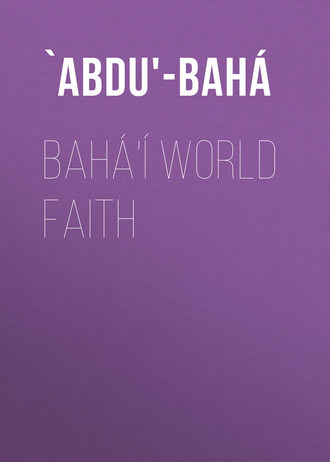 полная версия
полная версияBahá'í World Faith
Consider how powerful are the teachings of His Holiness Bahá’u’lláh. At a time when His Holiness was in the prison of Akká and was under the restrictions and threats of two bloodthirsty kings, notwithstanding this fact, His teachings spread with all power in Írán and other countries. Should any teaching, or any principle, or any community fall under the threat of a powerful and bloodthirsty monarch it will be annihilated within a short space of time. At present for fifty years the Bahá’ís in Írán and most regions have been under severe restrictions and the threat of sword and spear. Thousands of souls have given their lives in the arena of sacrifice and have fallen as victims under the swords of oppression and cruelty. Thousands of esteemed families have been uprooted and destroyed. Thousands of children have been made fatherless. Thousands of fathers have been bereft of their sons. Thousands of mothers have wept and lamented for their boys who have been beheaded. All this oppression and cruelty, rapacity and blood-thirstiness did not hinder or prevent the spread of the teachings of Bahá’u’lláh. They spread more and more every day, and their power and might became more evident.
It may be that some foolish person among the Íránians will affix his name to the contents of the Tablets of His Holiness Bahá’u’lláh or to the explanations given in the letters of ‘Abdu’l-Bahá and send it to that esteemed Assembly. Ye must be aware of this fact, for any Íránian who seeks fame or has some other intention will take the entire contents of the Tablets of His Holiness Bahá’u’lláh and publish them in his own name or in that of his community, just as happened at the Universal Races Congress in London before the war. An Íránian took the substance of the Epistles of His Holiness Bahá’u’lláh, entered that Congress, gave them forth in his own name and published them, whereas the wording was exactly that of His Holiness Bahá’u’lláh. Some such souls have gone to Europe and have caused confusion in the minds of the people of Europe and have disturbed the thoughts of some Orientalists. Ye must bear this fact in mind, for not a word of these teachings was heard in Írán before the appearance of Bahá’u’lláh. Investigate this matter so that it may become to you evident and manifest. Some souls are like parrots. They learn any note which they may hear, and sing it, but they themselves are unaware of what they utter. There is a sect in Írán at present made up of a few souls who are called Bábís, who claim to be followers of His Holiness the Báb, whereas they are utterly unaware of His Holiness. They have some secret teachings which are entirely opposed to the teachings of Bahá’u’lláh and in Írán people know this. But when these souls come to Europe, they conceal their own teachings and utter those of His Holiness Bahá’u’lláh, for they know that the teachings of His Holiness Bahá’u’lláh are powerful and they therefore declare publicly those teachings of Bahá’u’lláh in their own name. As to their secret teachings, they say that they are taken from the Book of Bayán, and the Book of Bayán is from His Holiness the Báb. When ye get hold of the translation of the Book of Bayán, which has been translated in Írán, ye will discover the truth that the teachings of Bahá’u’lláh are utterly opposed to the teachings of this sect. Beware lest ye disregard this fact. Should ye desire to investigate the matter further, inquire from Írán.
In fine, when traveling and journeying throughout the world, wherever one finds construction, it is the result of fellowship and love, while everything that is in ruin shows the effect of enmity and hatred. Notwithstanding this, the world of humanity has not become aware and has not awakened from the sleep of heedlessness. Again it engages in differences, in disputes and wrangling, that it may set up ranks of war and may run to and fro in the arena of battle and strife.
So it is with regard to the universe and its corruption, existence and non-existence. Every contingent being is made up of different and numerous elements and the existence of everything is a result of composition. That is to say, when between simple elements a composition takes place a being arises; the creation of beings comes about in this way. And when that composition is upset, it is followed by decomposition, the elements disintegrate, and that being becomes annihilated. That is to say, the annihilation of everything consists in the decomposition and the separation of elements. Therefore, every composition among the elements is the cause of life, while dissociation and separation are the cause of death. In short, attraction and harmony of things are the cause of the production of fruits and useful results, while repulsion and inharmony of things are the cause of disturbance and annihilation. From harmony and attraction, all living contingent beings, such as plant, animal and man, are realized, and from inharmony and repulsion decay sets in and annihilation becomes manifest. Therefore whatever is the cause of harmony, attraction and union among men is the life of the world of humanity, and whatever is the cause of difference, of repulsion and of separation is the cause of the death of mankind. And when you pass by a garden wherein vegetable beds and plants, flowers and fragrant herbs are all combined so as to form a harmonious whole, this is an evidence that this plantation and this rose garden have been cultivated and arranged by the care of a perfect gardener, while when you see a garden in disorder, lacking arrangement and confused, this indicates that it has been deprived of the care of a skillful gardener, nay, rather, it is nothing but a mass of weeds. It has therefore been made evident that fellowship and harmony are indicative of the training by the real Educator, while separation and dispersion prove wildness and deprivation of Divine training.
Should any one object that, since the communities and nations and races and peoples of the world have different formalities, customs, tastes, temperaments, morals, varied thoughts, minds and opinions, it is therefore impossible for ideal unity to be made manifest and complete union among men to be realized, we say that differences are of two kinds: One leads to destruction, and that is like the difference between warring peoples and competing nations who destroy one another, uproot each other’s families, do away with rest and comfort and engage in bloodshed and rapacity. That is blameworthy. But the other difference consists in variation. This is perfection itself and the cause of the appearance of Divine bounty. Consider the flowers of the rose garden. Although they are of different kinds, various colors and diverse forms and appearances, yet as they drink from one water, are swayed by one breeze and grow by the warmth and light of one sun, this variation and this difference cause each to enhance the beauty and splendor of the others. The differences in manners, in customs, in habits, in thoughts, opinions and in temperaments is the cause of the adornment of the world of mankind. This is praiseworthy. Likewise this difference and this variation, like the difference and variation of the parts and members of the human body, are the cause of the appearance of beauty and perfection. As these different parts and members are under the control of the dominant spirit, and the spirit permeates all the organs and members, and rules all the arteries and veins, this difference and this variation strengthen love and harmony and this multiplicity is the greatest aid to unity. If in a garden the flowers and fragrant herbs, the blossoms and fruits, the leaves, branches and trees are of one kind, of one form, of one color and of one arrangement, there is no beauty or sweetness, but when there is variety, each will contribute to the beauty and charm of the others and will make an admirable garden, and will appear in the utmost loveliness, freshness and sweetness. Likewise, when difference and variety of thoughts, forms, opinions, characters and morals of the world of mankind come under the control of one Supreme Power and the influence of the Word of the One True God, they will appear and be displayed in the most perfect glory, beauty, exaltation and perfection. Today nothing but the power of the Word of God which encompasses the realities of things can bring the thoughts, the minds, the hearts and the spirits under the shade of one Tree. He is the potent in all things, the vivifier of souls, the preserver and the controller of the world of mankind. Praise be to God, in this day the light of the Word of God has shone forth upon all regions, and from all sects, communities, nations, tribes, peoples, religions and denominations, souls have gathered under the shadow of the Word of Oneness and have in the most intimate fellowship united and harmonized!
CHAPTER SEVEN: SOUL, MIND AND SPIRIT
THE ORIGIN OF MAN
Know that it is one of the most abstruse spiritual truths that the world of existence, that is to say this endless universe, has no beginning.
We have already explained that the names and attributes of the Divinity themselves require the existence of beings. Although this subject has been explained in detail, we will speak of it again briefly. Know that an educator without pupils cannot be imagined, a monarch without subjects could not exist, a master without scholars cannot be appointed, a creator without a creature is impossible, a provider without those provided for cannot be conceived; for all the divine names and attributes demand the existence of beings. If we could imagine a time when no beings existed, this imagination would be the denial of the Divinity of God. Moreover, absolute non-existence cannot become existence. If the beings were absolutely non-existent, existence would not have come into being. Therefore, as the Essence of Unity, that is the existence of God, is everlasting and eternal—that is to say, it has neither beginning nor end—it is certain that this world of existence, this endless universe, has neither beginning nor end. Yes, it may be that one of the parts of the universe, one of the globes, for example, may come into existence, or may be disintegrated, but the other endless globes are still existing; the universe would not be disordered nor destroyed; on the contrary, existence is eternal and perpetual. As each globe has a beginning, necessarily it has an end, because every composition, collective or particular, must of necessity be decomposed; the only difference is that some are quickly decomposed, and others more slowly, but it is impossible that a composed thing should not eventually be decomposed.
It is necessary, therefore, that we should know what each of the important existences was in the beginning—for there is no doubt that in the beginning the origin was one: the origin of all numbers is one and not two. Then it is evident that in the beginning matter was one, and that one matter appeared in different aspects in each element; thus various forms were produced, and these various aspects as they were produced became permanent, and each element was specialized. But this permanence was not definite, and did not attain realization and perfect existence until after a very long time. Then these elements became composed, and organized and combined in infinite forms; or rather from the composition and combination of these elements innumerable beings appeared.
This composition and arrangement through the wisdom of God and His pre-existent might, were produced from one natural organization, which was composed and combined with the greatest strength, conformably to wisdom, and according to a universal law. From this it is evident that it is the creation of God, and is not a fortuitous composition and arrangement. This is why from every natural composition a being can come into existence, but from an accidental composition no being can come into existence. For example, if a man of his own mind and intelligence collects some elements and combines them, a living being will not be brought into existence, since the system is unnatural. This is the answer to the implied question, that, since beings are made by the composition and the combination of elements, why is it not possible for us to gather elements and mingle them together, and so create a living being. This is a false supposition, for the origin of this composition is from God; it is God who makes the combination, and as it is done according to the natural system, from each composition one being is produced, and an existence is realized. A composition made by man produces nothing, because man cannot create.
Briefly, we have said that from the composition and combination of elements, from their decomposition, from their measure, and from the effect of other beings upon them, resulted forms, endless realities, and innumerable beings. But it is clear that this terrestrial globe in its present form did not come into existence all at once; but that this universal existence gradually passed through different phases until it became adorned with its present perfection. Universal beings resemble and can be compared to particular beings, for both are subjected to one natural system, one universal law and divine organization. So you will find the smallest atoms in the universal system are similar to the greatest beings of the universe. It is clear that they come into existence from one laboratory of might under one natural system, and one universal law; therefore they may be compared to one another. Thus the embryo of man in the womb of the mother gradually grows and develops, and appears in different forms and conditions, until in the degree of perfect beauty it reaches maturity, and appears in a perfect form with the utmost grace. And in the same way, the seed of this flower which you see was in the beginning an insignificant thing, and very small; and it grew and developed in the womb of the earth, and after appearing in various forms, came forth in this condition with perfect freshness and grace. In the same manner it is evident that this terrestrial globe having once found existence, grew and developed in the matrix of the universe, and came forth in different forms and conditions, until gradually it attained this present perfection, and became adorned with innumerable beings, and appeared as a finished organization.
Then it is clear that original matter, which is in the embryonic state, and the mingled and composed elements which were its earliest forms, gradually grew and developed during many ages and cycles, passing from one shape and form to another, until they appeared in this perfection, this system, this organization and this establishment, through the supreme wisdom of God.
Let us return to our subject that man, in the beginning of his existence and in the womb of the earth, like the embryo in the womb of the mother, gradually grew and developed, and passed from one form to another, from one shape to another, until he appeared with this beauty and perfection, this force and this power. It is certain that in the beginning he had not this loveliness and grace and elegance, and that he only by degrees attained this shape, this form, this beauty, and this grace. There is no doubt that the human embryo did not at once appear in this form, neither did it then become the manifestation of the words: “Praise be unto God, the best of Creators.” Gradually, it passed through various conditions and different shapes, until it attained this form and beauty, this perfection; grace, and loveliness. Thus it is evident and confirmed that the development and growth of man on this earth, until he reached his present perfection, resembled the growth and development of the embryo in the womb of the mother: by degrees it passed from condition to condition, from form to form, from one shape to another, for this is according to the requirement of the universal system and divine law.
That is to say, the embryo passes through different states and traverses numerous degrees, until it reaches the form in which it manifests the words: “Praise be to God, the best of Creators,” and until the signs of reason and maturity appear. And in the same way, man’s existence on this earth, from the beginning until it reaches this state, form, and condition, necessarily lasts a long time, and goes through many degrees until it reaches this condition. But from the beginning of man’s existence he is a distinct species. In the same way, the embryo of man in the womb of the mother was at first in a strange form; then this body passes from shape to shape, from state to state, from form to form, until it appears in utmost beauty and perfection. But even when in the womb of the mother and in this strange form, entirely different from his present form and figure, he is the embryo of the superior species, and not of the animal; his species and essence undergo no change. Now, admitting that the traces of organs which have disappeared actually exist, this is not a proof of the impermanence and the non-originality of the species. At the most it proves that the form, and fashion, and the organs of man have progressed. Man was always a distinct species, a man, not an animal. So, if the embryo of man in the womb of the mother passes from one form to another, so that the second form in no way resembles the first, is this a proof that the species has changed? that it was at first an animal, and that its organs progressed and developed until it became a man? No indeed! How puerile and unfounded is this idea and this thought! For the proof of the originality of the human species, and of the permanency of the nature of man, is clear and evident.
MODIFICATION OF SPECIES
We have now come to the question of the modification of species and of organic development: that is to say, to the point of inquiring whether man’s descent is from the animal.
This theory has found credence in the minds of some European philosophers, and it is now very difficult to make its falseness understood, but in the future it will become evident and clear, and the European philosophers will themselves realize its untruth. For verily it is an evident error. When man looks at the beings with a penetrating regard, and attentively examines the condition of existences, and when he sees the state, the organization, and the perfection of the world, he will be convinced that in the possible world there is nothing more wonderful than that which already exists. For all existing beings, terrestrial and celestial, as well as this limitless space and all that is in it, have been created and organized, composed, arranged, and perfected as they ought to be; the universe has no imperfection; so that if all beings became pure intelligence and reflected for ever and ever, it is impossible that they could imagine anything better than that which exists.
If, however, the creation in the past had not been adorned with utmost perfection, then existence would have been imperfect and meaningless, and in this case creation would have been incomplete. This question needs to be considered with the greatest attention and thought. For example, imagine that the world of possibility—that is, the world of existence—resembles in a general way the body of man. If this composition, organization, perfection, beauty, and completeness which now exist in the human body were different, it would be absolute imperfection. Now, if we imagine a time when man belonged to the animal world, or when he was merely an animal, we shall find that existence would have been imperfect; that is to say, there would have been no man, and this chief member, which in the body of the world is like the brain and mind in man, would have been missing. The world would then have been quite imperfect. It is thus proved that if there had been a time when man was in the animal kingdom, the perfection of existence would have been destroyed; for man is the greatest member of this world, and if the body was without this chief member, surely it would be imperfect. We consider man as the greatest member because, among the creatures, he is the sum of all existing perfections. When we speak of man, we mean the perfect one, the foremost individual in the world, who is the sum of spiritual and apparent perfections, and who is like the sun among the beings. Then imagine that at one time the sun did not exist, but that it was a planet—surely at such a time the relations of existence would be disordered. How can such a thing be imagined? To a man who examines the world of existence, what we have said is sufficient.
There is another more subtle proof: all these endless beings which inhabit the world, whether man, animal, vegetable, mineral—whatever they may be—are surely, each one of them, composed of elements. There is no doubt that this perfection which is in all beings, is caused by the creation of God from the composing elements, by their appropriate mingling and proportionate quantities, the mode of their composition, and the influence of other beings. For all beings are connected together like a chain, and reciprocal help, assistance, and influence belonging to the properties of things, are the causes of the existence, development, and growth of created beings. It is confirmed through evidences and proofs that every being universally acts upon other beings, either absolutely or through association. Finally, the perfection of each individual being, that is to say the perfection which you now see in man or apart from him, with regard to their atoms, members, or powers, is due to the composition of the elements, to their measure, to their balance, to the mode of their combination, and to mutual influence. When all these are gathered together, then man exists.
As the perfection of man is entirely due to the composition of the atoms of the elements, to their measure, to the method of their combination, and to the mutual influence and action of the different beings—then, since man was produced ten or a hundred thousand years ago from these earthly elements with the same measure and balance, the same method of combination and mingling, and the same influence of the other beings, exactly the same man existed then as now. This is evident and not worth debating. A thousand million years hence, if these elements of man are gathered together and arranged in this special proportion, and if the elements are combined according to the same method, and if they are affected by the same influence of other beings, exactly the same man will exist. For example, if after a hundred thousand years there is oil, fire, a wick, a lamp, and the lighter of the lamp—briefly, if there are all the necessaries which now exist, exactly the same lamp will be obtained.
These are conclusive and evident facts. But the arguments which these European philosophers have used raise doubtful proofs and are not conclusive.
THE KINGDOM OF MAN
Know that people belong to two categories, that is to say, they constitute two parties. One party deny the spirit, and say that man also is a species of animal; for they say, do we not see that animals and men share the same powers and senses? These simple single elements which fill space are endlessly combined, and from each of these combinations one of the beings is produced. Among these beings is the possessor of spirit, of the powers and of the senses. The more perfect the combination, the nobler is the being. The combination of the elements in the body of man is more perfect than the composition of any other being; it is mingled in absolute equilibrium, therefore it is more noble and more perfect. “It is not,” they say, “that he has a special power and spirit which the other animals lack: animals possess sensitive bodies, but man in some powers has more sensation—although, in what concerns the outer senses, such as hearing, sight, taste, smell, touch, and even in some interior powers like memory, the animal is more richly endowed than man.” “The animal, too,” they say, “has intelligence and perception”: all that they concede is that man’s intelligence is greater.
This is what the philosophers of the present state; this is their saying, this is their supposition, and thus their imagination decrees. So with powerful arguments and proofs, they make the descent of man go back to the animal, and say that there was once a time when man was an animal; that then the species changed, and progressed little by little until it reached the present status of man.
But the theologians say: No, this is not so. Though man has powers and outer senses in common with the animal, yet an extraordinary power exists in him of which the animal is bereft. The sciences, arts, inventions, trades, and discoveries of realities, are the results of this spiritual power. This is a power which encompasses all things, comprehends their realities, discovers all the hidden mysteries of beings, and through this knowledge controls them: it even perceives things which do not exist outwardly; that is to say, intellectual realities which are not sensible, and which have no outward existence, because they are invisible; so it comprehends the mind, the spirit, the qualities, the characters, the love and sorrow of man, which are intellectual realities. Moreover, these existing sciences, arts, laws, and endless inventions of man at one time were invisible, mysterious, and hidden secrets; it is only the all-encompassing human power which has discovered and brought them out from the plane of the invisible to the plane of the visible. So telegraphy, photography, phonography, and all such inventions and wonderful arts, were at one time hidden mysteries: the human reality discovered and brought them out from the plane of the invisible to the plane of the visible. There was even a time when the qualities of this iron which you see—indeed of all the metals—were hidden mysteries; men discovered this metal, and wrought it in this industrial form. It is the same with all the other discoveries and inventions of man, which are innumerable.


